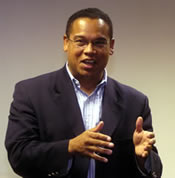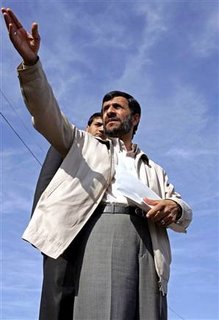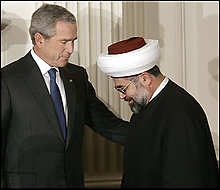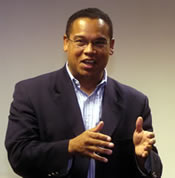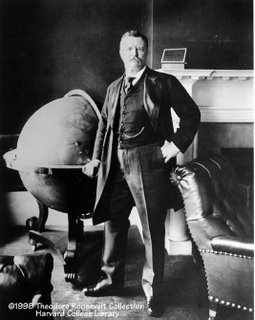On October 19, 38 Muslim scholars from 20 different countries, sent the Pope Benedict XVI urging mutual tolerance and respect. When I first read this letter I wanted to dissect and respond to it section by section but I decided to leave it alone and leave it to you to decide how to respond to this letter.
I've reprinted what I thought were the most important excerpts but the entire letter can be read
here.
OPEN LETTER TO HIS HOLINESS POPE BENEDICT XVIIn the Name of God, the Compassionate, the Merciful,
Do not contend with people of the Book except in the fairest way.
(The Holy Qur'an, al-Ankabut, 29:4)
Your Holiness,
With regards to your lecture at the University of Regensburg in Germany on September 12th 2006, we thought it appropriate, in the spirit of open exchange, to address your use of a debate between the Emperor Manuel II Paleologus and a "learned Persian" as the starting point for a discourse on the relationship between reason and faith. While we applaud your efforts to oppose the dominance of posi-tivism and materialism in human life, we must point out some errors in the way you mentioned Islam as a counterpoint to the proper use of reason, as well as some mistakes in the assertions you put forward in support of your argument.
There is no Compulsion in ReligionYou mention that "according to the experts" the verse which begins, There is no compulsion in religion (al-Baqarah 2:256) is from the early period when the Prophet "was still powerless and under threat," but this is incorrect. In fact this verse is acknowledged to belong to the period of Quranic revelation corresponding to the political and military ascendance of the young Muslim community.
There is no compulsion in religion was not a command to Muslims to remain steadfast in the face of the desire of their oppressors to force them to renounce their faith, but was a reminder to Muslims themselves, once they had attained power, that they could not force another's heart to believe. There is no compulsion in religion addresses those in a position of strength, not weakness. The earliest commen-taries on the Qur'an (such as that of Al-Tabari) make it clear that some Muslims of Medina wanted to force their children to convert from Judaism or Christianity to Islam, and this verse was precisely an answer to them not to try to force their children to convert to Islam.
Moreover, Muslims are also guided by such verses as Say: The truth is from your Lord; so whosoever will, let him believe, and whosoever will, let him disbelieve. (al-Kahf 18:29); and Say: O disbelievers! I worship not that which ye worship; Nor worship ye that which I worship. And I shall not worship that which ye worship. Nor will ye worship that which I worship. Unto you your religion, and unto me my religion (al-Kafirun: 109:1-6).
What is "Holy War"?We would like to point out that "holy war" is a term that does not exist in Islamic languages. Jihad, it must be emphasized, means struggle, and specifically struggle in the way of God. This struggle may take many forms, including the use of force.
Though a jihad may be sacred in the sense of being directed towards a sacred ideal, it is not necessarily a "war". Moreover, it is noteworthy that Manuel II Paleo-logus says that "violence" goes against God's nature, since Christ himself used violence against the money-changers in the temple, and said "Do not think that I came to bring peace on the earth; I did not come to bring peace, but a sword" (Matthew 10:34-36).
When God drowned Pharaoh, was He going against His own Nature? Perhaps the emperor meant to say that cruelty, brutality, and aggression are against God's Will, in which case the classical and traditional law of jihad in Islam would bear him out completely. You say that "naturally the emperor knew the instructions, developed later and recorded in the Qur'an, con-cerning holy war." However, as we pointed out above concerning There is no compulsion in religion, the aforementioned instructions were not later at all. Moreover, the emperor's state-ments about violent conversion show that he did not know what those instr-uctions are and have always been.
The authoritative and traditional Islamic rules of war can be summarized in the following principles:
1. Non-combatants are not permitted or legitimate targets. This was emphasized explicitly time and again by the Prophet, his Companions, and by the learned tradition since then.
2. Religious belief alone does not make anyone the object of attack. The original Muslim community was fighting against pagans who had also expelled them from their homes, perse-cuted, tortured, and murdered them. Thereafter, the Islamic conquests were political in nature.
3. Muslims can and should live peacefully with their neighbours. And if they incline to peace, do thou incline to it; and put thy trust in God (al-Anfal 8:61). However, this does not exclude legitimate self-defence and maintenance of sovereignty.
Muslims are just as bound to obey these rules as they are to refrain from theft and adultery. If a religion regulates war and describes circumstances where it is necessary and just, that does not make that religion war-like, anymore than regulating sexuality makes a religion prurient. If some have disregarded a long and well-established tradition in favour of utopian dreams where the end justifies the means, they have done so of their own accord and without the sanction of God, His Prophet, or the learned tradition.
God says in the Holy Qur'an: Let not hatred of any people seduce you into being unjust. Be just, that is nearer to piety (al-Ma'idah _5:_8). In this context we must state that the murder on September __17th of an innocent Catholic nun in Somalia-and any other similar acts of wanton individual violence-'in reaction to' your lecture at the University of Regensburg, is completely un-Islamic, and we totally condemn such acts.
Forced ConversionThe notion that Muslims are commanded to spread their faith "by the sword" or that Islam in fact was largely spread "by the sword" does not hold up to scrutiny. Indeed, as a political entity Islam spread partly as a result of conquest, but the greater part of its expansion came as a result of preaching and mission-ary activity.
Islamic teaching did not prescribe that the conquered populations be forced or coerced into converting. Indeed, many of the first areas conquered by the Muslims remained predominantly non-Muslim for centuries. Had Muslims desired to convert all others by force, there would not be a single church or synagogue left anywhere in the Islamic world. The command There is no compulsion in religion means now what it meant then. The mere fact of a person being non-Muslim has never been a legitimate causus belli in Islamic law or belief.
As with the rules of war, history shows that some Muslims have violated Islamic tenets concerning forced conversion and the treatment of other religious communities, but history also shows that these are by far the exception which proves the rule. We emphatically agree that forcing others to believe-if such a thing be truly possible at all-is not pleasing to God and that God is not pleased by blood. Indeed, we believe, and Muslims have always believed, that Whoso slays a soul not to retaliate for a soul slain, nor for corruption done in the land, it shall be as if he had slain mankind altogether (al-Ma'idah _5:32__).
Something New?
You mention the emperor's assertion that "anything new" brought by the Prophet was "evil and inhuman, such as his alleged command to spread by the sword the faith he preached." What the emperor failed to realize-aside from the fact (as mentioned above) that no such command has ever existed in Islam-is that the Prophet never claimed to be bringing anything fundamentally new.
God says in the Holy Qur'an, Naught is said to thee (Muhammad) but what already was said to the Messengers before thee (Fussilat __41:43__), and, Say (Muhammad): I am no new thing among the messengers (of God), nor know I what will be done with me or with you. I do but follow that what is Revealed to me, and I am but a plain warner (al-Ahqaf, __46:9_).Thus faith in the One God is not the property of any one religious community. According to Islamic belief, all the true prophets preached the same truth to different peoples at different times. The laws may be different, but the truth is unchanging.
Christianity and IslamChristianity and Islam are the largest and second largest religions in the world and in history. Christians and Muslims reportedly make up over a third and over a fifth of humanity respectively. Together they make up more than __55% of the world's population, making the relation-ship between these two religious communities the most important factor in contributing to meaningful peace around the world. As the leader of over a billion Catholics and moral example for many others around the globe, yours is arguably the single most influential voice in continuing to move this relationship forward in the direction of mutual under-standing. We share your desire for frank and sincere dialogue, and recognize its importance in an increasingly interconnected world.
Upon this sincere and frank dialogue we hope to continue to build peaceful and friendly relation-ships based upon mutual respect, justice, and what is common in essence in our shared Abrahamic tradition, particularly 'the two greatest commandments' in Mark 12:29-31__ (and, in varying form, in Matthew 22:37-40_), that, the Lord our God is One Lord; / And thou shalt love the Lord thy God with all thy heart, and with all thy soul, and with all thy understanding, and with all thy strength: this is the first command-ment. / And the second command-ment is like, namely this, Thou shalt love thy neighbour as thyself. There is none other commandment greater than these. Muslims thus appreciate the following words from the Second Vatican Council:
The church has also a high regard for the Muslims. They worship God, who is one, living and subsistent, merciful and almighty, the Creator of heaven and earth, who has also spoken to humanity. They endeavour to submit themselves without reserve to the hidden decrees of God, just as Abraham submitted himself to God's plan, to whose faith Muslims eagerly link their own.
Although not acknowledging him as God, they vener-ate Jesus as a prophet; his virgin Mother they also honour, and even at times devoutly invoke. Further, they await the day of judgment and the reward of God following the resurrection of the dead. For this reason they highly esteem an upright life and worship God, especially by way of prayer, alms-deeds and fasting. (Nostra Aetate, 28 October 1965)
And equally the words of the late Pope John Paul II, for whom many Muslims had great regard and esteem:
We Christians joyfully recognize the religious values we have in common with Islam.
Today I would like to repeat what I said to young Muslims some years ago in Casablanca: "We believe in the same God, the one God, the living God, the God who created the world and brings his creatures to their perfection" (Insegnamenti, VIII/2 [1985] p.497, quoted during a general audience on May 5, 1999_.
Muslims also appreciated your un-precedented personal expres-sion of sorrow, and your clarification and assurance (on the 17th of September) that your quote does not reflect your own personal opinion, as well as the Cardinal Secretary of State Tarcisio Bertone's affirmation (on the 16th of September) of the conciliar document Nostra Aetate. Finally, Muslims appreciated that (on September 25th) in front of an assem-bled group of ambassadors from Muslim countries you expressed "total and profound respect for all Muslims". We hope that we will all avoid the mistakes of the past and live together in the future in peace, mutual acceptance and respect.
And all praise belongs to God, and there is neither power nor strength except through God.
SIGNED
****
I strongly recommend visiting
FIGHT THE GOOD FIGHT's blogsite to see a tribute to the Coast Guard and yours truly.










